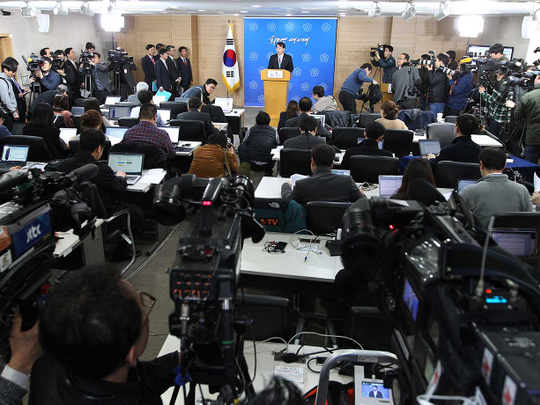
Seoul: South Korea said on Tuesday it would impose new sanctions against 40 individuals and 30 entities because of suspected links to North Korea’s weapons programme and would ban vessels that had stopped at North Korean ports in the past 180 days.
The new measures are designed to discourage shipping firms and trading companies from doing business with the North to further isolate it, South Korea said.
The decision to issue more unilateral sanctions against the North follows a UN Security Council resolution triggered by the isolate state’s fourth nuclear test in January and a long-range rocket launch last month.
Tension in the region is high as South Korean and US troops began military exercises on Monday in an annual test of their defences against the North, which called the drills “nuclear war moves” and threatened to respond with an all-out offensive.
The individuals subject to financial sanctions announced on Tuesday include a Singaporean and a Taiwan national who are heads of a shipping firm and a trading company, the government said.
South Korea also blacklisted a Thai shipping firm called Mariner’s Shipping & Trading and Taiwan company Royal Team Corporation.
South Korea will ban those on the list from engaging in financial transactions with South Korean entities and freeze assets that are held in the country, the government said.
After the North’s rocket launch last month, South Korea suspended operations at the Kaesong industrial zone, just on the North Korean since of their common border, which had been run jointly with the North for more than a decade.
The industrial park, operated with investment from the capitalist South, was a key source of hard currency for the impoverished North.
South Korea would also discontinue participation in a pilot project that brought Russian coal to South Korea through the/sNorth Korean port of Rajin, a foreign ministry official told reporters in a joint briefing with other government agencies.
Trial shipments had been carried out in 2014 and 2015, under a consortium involving South Korean steelmaker POSCO, Hyundai Merchant Marine and railway operator Korail, from Rajin.
The three shipments, of a total 294,000 tonnes of coal, represented less than 1 percent of South Korea’s overall imports for that period.
South Korean President Park Geun-hye and Russian leader Vladimir Putin signed an agreement in 2013 to cooperate and promote the project linking Russia’s Khasan and Rajin.
Lee Suk-joon, minister of South Korea’s office for government policy coordination, said the government continued to advise against South Koreans using North Korean restaurants overseas. South Korea views such establishments as a source of foreign currency for the isolated state.












